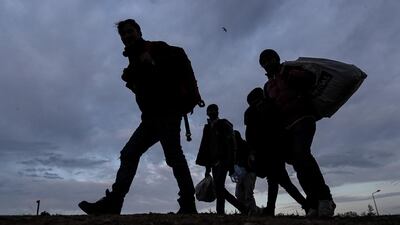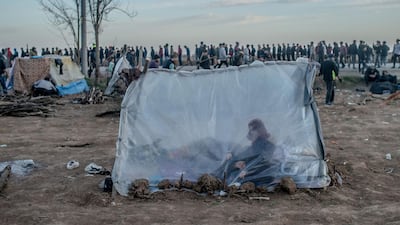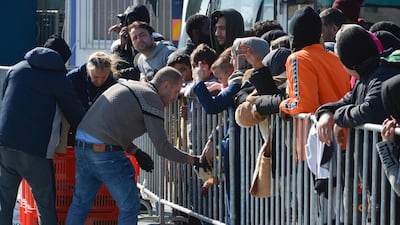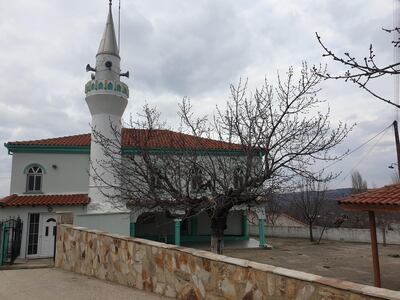The five migrants crossed the river and evaded the waiting Greek security forces to reach the European Union. Any joy they felt was short-lived.
The young men were barely five kilometres from the river that marks Greece’s north-east border with Turkey when the police caught up with them.
While they waited for the unmarked van to take them away, a solitary officer stood guard as they squatted with their backs to a crash barrier on the slip road of the highway that runs along the 200-kilometre border.
The men, detained close to the town of Sakkos, have suffered the same fate as many other migrants and refugees from Africa and the Middle East over the last week - although they got further than most.
Since Saturday, Greece has claimed to have stopped more than 32,000 migrants from entering the country illegally and arrested more than 230 amid complaints from rights groups about the alleged excessive use of force and flaunting of EU laws on asylum.
The operation has seen soldiers and police drafted in from across the country to defend the border against desperate migrants who EU leaders say were “plied with false promises” from Turkey’s leaders of a new life in the 27-nation bloc.
The focus of clashes since Thursday has been the border crossing at Kastanies at the northern end of the border, which faces the Turkish city of Edirne.
Turkey hosts four million refugees, some 3.6 million of them from Syria. Under a 2016 agreement struck with the EU, Turkey tightened border controls in return for billions of euros.
Since Ankara announced last week it would not impede those seeking to enter Europe, thousands of Afghans, Iranians, Syrians, Pakistanis and others from Africa and Asia have rushed to try their luck.
The government Recep Tayyip Erdogan has orchestrated the mass movement, bussing in migrants to make the final step into the EU. But clashes at Kastanies led to migrants seeking other entry points along the border, said a UN official, including a large area of wetlands to the south.
Military vehicles patrol the border road there and drive down tracks into the scrubby fields next to the river to search for hidden migrants inside agricultural buildings.
The action comes alive at night, say soldiers, when migrants seek to use the cover of darkness to avoid the helicopters and troops on the ground.
But this is a border that has seen migrants crossing for years. The residents of the border towns and villages have learned to cope with successive waves following upheavals in the Middle East.
“I don’t care where they come from, somebody needs to care for them,” said Litsa, a 70-year-old who lives in the farming village of Kipoi. “They need to treat people like people, not animals.”
The village - less than a kilometre from a checkpoint for trucks passing between Turkey and Greece at the southern end of the shared border – is used to its share of arrivals.
A decade ago, around 50 people used to walk through the village “morning, noon and night,” said Litsa, who declined to give her full name.
They were treated with compassion by the villagers who gave them food and water. When an Afghan woman, travelling with her husband and young child, gave birth outside Litsa’s shop in the centre of the village, she called the ambulance.
But the current Greek operation has been effective in stopping the migrants. Litsa, who can see into Turkey from her front garden over the rooftops of her neighbours, has not seen anyone pass through for days.
Security is noticeably tighter close to the checkpoint, police officials confirm. After the trucks pass through passport control at the Greek end of the border, they cross a bridge before reaching Turkish border checks, a kilometre-and-a-half away.
Despite the collusion of the Turkish government in pushing the migrants through its borders and into Greece, it is not in their interests to allow people to be smuggled inside lorries, say officials.
The checkpoint allows Turkey to transport its goods across Europe, particularly down to southern Italy and the leadership cannot afford the checkpoint to be closed.

Most of the trucks lined up along the Greek side of the crossing appeared to be Turkish haulage companies. The security emergency has not affected the flow of trucks even with increased traffic diverted from other checkpoints that have been closed as Greece robustly protects its borders.
But even if the border crossing is under tight scrutiny there are plenty of other ways to get across the river Evros. A narrow road used by locals runs past the checkpoint, which turn into rocky tracks that lead all the way to the river.
It is here that the migrants choose to cross, some in boats, some swimming, say villagers. They don’t always see them, but find their sodden, discarded clothes among their crops and bee hives the next morning, so they know they have passed.

The residents of Gemisti, a sleepy farming village on the southern end of the border, say they have changed the habits of generations and lock their homes and remove their car keys from the ignition after thefts blamed on migrants.
Hunters and farmers from the village have joined the police effort to keep the migrants out, said a villager who sold olives at the border checkpoint. The villager, who gave his name only as Christos, 29, said that the farmers wanted their riverside fields back that had been appropriated by the military as they confront the new arrivals.
The large army presence with a group billeted next to the checkpoint has stopped the arrivals for now, said Christos. “When the police go, we will continue the way we were.”
The increased security presence is clear from travelling the border road, which at points runs alongside the river that marks the end of Greek territory.
The military will be bolstered by an extra 700 million euros and 100 EU border officials, senior EU officials announced on Tuesday.
A group of soldiers operating in the south were privately dismissive of the offer. “Have you seen a Frontex [the EU’s border force] officer?” said one. “They’re like the CIA – you can’t see them.”
The operation had nonetheless appeared to have worked for now with one unit picking up 40 people a day now finding no-one. The Greek prime minister, Kyriakos Mitsotakis, told reporters on Tuesday that the threat to send hundreds of thousands of people to Greece had been “neutralised”.
Mr Mitsotakis visited the town of Feres on Tuesday to thank officials for their efforts at the border, despite accusations of the use of excessive force with the use of tear gas and bullets aimed at putting off efforts to travel to Greece.
“The reckless measures being taken by the Greek authorities are a blatant breach of EU and international law that will put lives at risk,” said Amnesty International. “People seeking asylum are once again being used as bargaining chips in a callous political game.”

EU leaders who appeared with Mr Mitsotakis on Tuesday gave the bloc’s full backing to Greek efforts, did not address the controversies over its robust response and declined to answer questions.
Dimitrios Kolgionis, a senior Feres official, denied claims of excessive force. “The mission of the army is to protect the border,” he said. “They have followed protocol.”
The military appears to have the strong backing of people in the area but patience with the European Union, Turkey and the migrants themselves appears to be running thin amid continued blanket news coverage of the crisis on its eastern borders.
“Greece is full of these people. We tried to help them, we have done that because we’re in Europe,” said Chrysovalantis Toufauvs, who works at a filling station close to the border. “Turkey’s pushed them to Greece. We have a good relationship but this is … an act of war.”
The cost of battles to reach the European Union are felt keenly in a remote village in the hills home to 150 Muslim families. Muslims make up an estimated two per cent of Greece’s 11 million population, many in the north east region bordering Turkey.
Sidiro and its mosque is reached up narrow roads that are shared with goats driven by herders and where villagers earn 80 per cent of their income through tobacco crops.
A kilometre from the mosque at Sidiro is a hilltop plot of land on a hilltop where some 40 to 50 migrants have been buried at the request of authorities over the last two decades. All but two of them remain unidentified.
The imam, 38, who declined to be named, said that nine were buried on the same day after being killed by a train. Later, a five-year-old child and a grandmother were buried, who died in the same way, he said. Others are reported to have died while crossing the Evros during previous attempted migrations.
The most recent burials are the only ones that have been identified and marked by gravestones, two Syrians, aged 31 and 20, who died on the same day in 2014. Since then, Muslim refugees have been buried elsewhere.
“They are the only ones that have names and that is because they have family here,” said the imam. “They came, they were refugees, and that’s all we know.”















